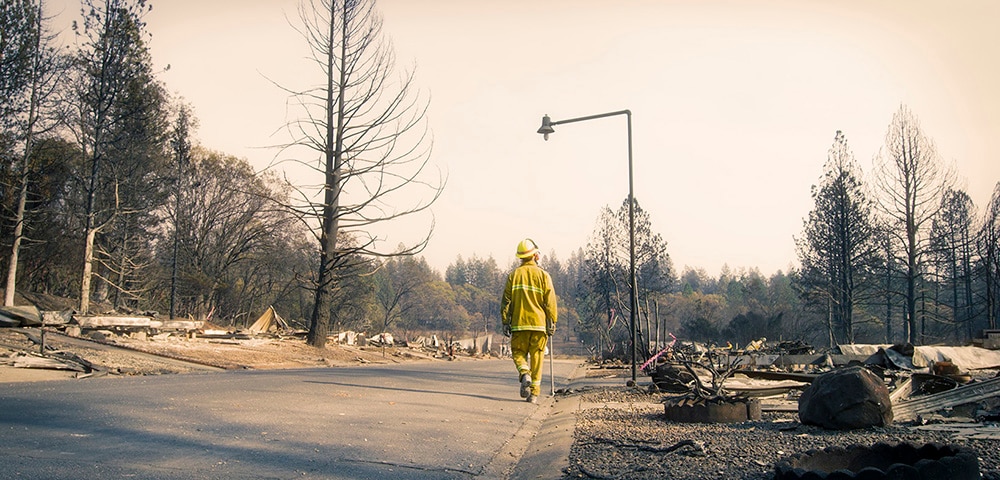Key Questions: Do the California Wildfires Put Any Investments at Risk?

The Key Wealth Institute is a team of highly experienced professionals representing various disciplines within wealth management who are dedicated to delivering timely insights and practical advice. From strategies designed to better manage your wealth, to guidance to help you better understand the world impacting your wealth, Key Wealth Institute provides proactive insights needed to navigate your financial journey.
The devastating wildfires in Greater Los Angeles are likely to be the costliest natural disaster in U.S. history, and our most heartfelt thoughts go out to all those affected by these tragic events. The human impact is immeasurable and the loss of lives, homes, businesses, and schools has placed communities in peril as they begin to recover and rebuild. The financial impact is staggering: More than 10,000 structures have been destroyed in one of the most expensive real estate markets in the country. Preliminary estimates suggest total damages and economic losses could range as high as $250 billion to $275 billion, posing significant financial implications to related municipalities and utility companies. As investors, we must consider the financial implications in times of natural disasters and ask, “What do the California wildfires mean for utility companies and municipal bonds?”
Utilities
The wildfires’ impacts to the electric utility companies are perhaps the most direct. In California, both private and public electric utilities typically bear wildfire-related losses and costs if it is determined that they have contributed to the wildfires. Over the past decade, these losses and costs have accumulated into the billions, and California electric utilities are still paying off these liabilities today.
Although the current devasting wildfires are in California, natural disasters are by no means unique to the state. In recent years, several large wildfires have occurred in other states and negatively impacted their respective utilities’ financial health. Credit-rating agencies, as a result, took negative credit-rating actions on these utilities. And the consequence of any credit-rating downgrades, in turn, could lead to higher interest rates on the money that utilities borrow.
With wildfire risks on the rise across the U.S., utilities may accordingly be at risk of bearing ever higher wildfire-related losses and mitigation expenses, insurance premiums, interest expense, and potential litigation costs. Investors may thus need to reassess the risk profiles of private and public electric utilities and question the old adage that these companies are defensive investments.
Municipal Bonds
Debt issued by municipalities is principally secured by the full faith, credit, and taxing power of the municipality (i.e., property taxes) and specific pledged revenues (utility revenues, tolls, income taxes, and sales taxes). In addition, the displacement of residents and businesses following a natural disaster will undoubtedly cause a decrease in economic activity in the short term. The financial implications that municipalities face can be measured in the short term, medium term, and long term.
Short-Term Impact
- Pledged revenue streams become strained as consumption by consumers and businesses abruptly drops.
- Property tax receipts go down as state laws often allow an immediate reduction and/or delay in property tax assessments following a natural disaster.
- Local government expenditures rise immediately to aid recovery efforts.
Medium-Term Impact
- Federal and state aid eases the financial burden on local governments, although financing costs increase with a reduction in creditworthiness.
- Municipalities face potential erosion of their tax bases because of the resulting decrease in property values.
- Other revenue streams increase as rebuilding efforts bring rises in both sales tax and income tax receipts, somewhat offsetting lower property tax receipts.
Long-Term Impact
- Very low default risk for municipalities affected by natural disasters, historically.
- Often full recovery in creditworthiness to municipalities with unlimited taxing power.
The support of the Federal Emergency Management Agency (FEMA) is essential to state and local governments in the immediate aftermath of a natural disaster. FEMA also administers the Disaster Relief Fund (DRF), which facilitates rebuilding efforts for affected communities. Such federal support in previous natural disasters has bolstered municipal finances, enabling a quicker recovery.
However, some investors are questioning whether FEMA and the DRF will continue to receive sufficient funding given the increasing frequency and scale of natural disasters. The rising projected national deficit, a new Congress, and change in presidential administrations have raised such concerns further. Increased federal debt issuance puts upward pressure on interest rates for all borrowers, so funding mechanisms for disaster recovery efforts may affect a much broader constituency than just the Greater Los Angeles area.
For investors, higher interest rates bring a mixed bag of competing forces. Rising rates cause existing bond values to decline but offer higher rates of return on new investments. Higher rates are a vote of confidence in the economy, but have the potential to curb growth by increasing borrowing costs to businesses and consumers. That said, disaster recovery efforts have historically seen both parties work together and put aside partisan politics, which should continue with respect to the current wildfires. Moreover, a diversified portfolio across multiple asset classes will serve an investor well in such environments.
Natural disasters are part of our past, present, and future, unfortunately. The wildfires may likely cause short-term price declines and ratings downgrades for some municipalities in the affected areas. A-rated municipal issuers have never experienced default as the result of a natural disaster, and we don’t expect that to change in this event. Disaster aid from federal, state, and nonprofit organizations will offer financial support for emergency-related expenses and allow these communities to respond, recover, and rebuild. We believe they will.
For more information, please contact your advisor.